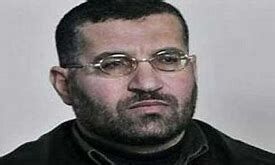Marwan Issa
| Marwan Issa | |
|---|---|
 | |
| name | Marwan Abdul Karim Issa |
| other names | Abu al-Baraa |
| Personal details | |
| brith year | 1965 AD - 1343 SH - 1384 HA |
| birth place | Gaza, Palestine |
| religion | Islam |
| faith | Sunni |
| known for |
|
Marwan Issa is the deputy commander of the Izz al-Din al-Qassam Brigades, the military wing of Hamas. Some sources claim that Issa is the actual leader of the Qassam Brigades; however, he is still the deputy of Hamas leader Mohammad Deif and serves as the representative of the Brigades in the political bureau of Hamas. Israel accuses him of being involved in the October 2023 attacks.
Birth
Marwan Abdul Karim Issa, known as Abu al-Baraa, was born in 1965 in Bureij refugee camp located in the central Gaza Strip. He grew up with the hope of returning to the village where his family came from.
Military Activities
He joined the Muslim Brotherhood in his youth and participated in its defensive, social and organizational activities.
Prison
He was arrested in 1987 for joining the Hamas movement. Later, the Palestinian Self-Rule authorities arrested him in 1997.
Joining Hamas
He joined Hamas at the age of 19. His experience in prison shaped his Qassami thought and he immediately joined it after being released from prison. He progressed in its ranks until he became one of the leaders of the operational decisions. He fought independently or with the consultation of Yahya Sinwar, the leader of the Gaza movement.
In the Custody of the Zionist Regime
He, , along with some of the prominent figures of the movement such as Hasan Salama, was part of a group that participated in a series of martyrdom operations in 1996 in retaliation for the assassination of Engineer Yahya Ayyash. He was subsequently detained for 4 years and was released after the al-Aqsa intifada in 2000. After his release, he played a central role in transferring the Qassam Brigades from semi-military nuclei that were organized according to a military structure, to brigades, units and battalions based on a clear military hierarchy. He remained anonymous until 2005, 10 days before Israel's withdrawal from Gaza, when he was officially introduced as one of the first-line leaders of the Qassam Brigades.
Military Operations
On June 25, 2006, Palestinian armed groups, including Hamas, launched a cross-border raid into Israel and captured Gilad Shalit, a 19-year-old soldier. Hamas held Shalit as part of a prisoner exchange plan in October 2011 in exchange for 1,027 Palestinian prisoners in Israeli jails and Issa played a key role in arranging the prisoner swap.
Failed Assassination
The Israeli army carried out several air strikes on the Gaza Strip on November 14, 2012, which resulted in the killing of Ahmad al-Jaabari, the commander of the Izz al-Din al-Qassam Brigades at the time. He was also targeted in these attacks but survived.
Political Activities
He made a rare appearance at a conference organized by an anonymous think tank affiliated with Hamas in March 2015, where he spoke about the verdict of the Egyptian court on February 3, 2015, which had placed the Izz al-Din al-Qassam Brigades and Hamas on the terrorist list. He said that Hamas is not currently seeking a military confrontation with Israel but is primarily interested in doubling its power for future confrontation by building its missiles and createing regional coalitions.
In 2017, Abu al-Baraa entered Egypt as a part of a military-political delegation to negotiate a prisoner exchange and his visits in the following years were repeated to discuss the cases related to prisoners, ceasefire and crossings. He was elected in the same year as one of the members of the political bureau representing the military branch of Hamas and was placed on the US terrorist lists in 2019. He was then re-elected to the same position in 2021.
Repeated Threat of Assassination
In February 2020, leaked information revealed that Israel intended to assassinate Issa and Yahya Sinwar, the leader of Hamas, in Gaza. When they learned of this plot, Egyptian intelligence officials traveled to Israel to persuade them not to carry out these assassinations. The Izz al-Din al-Qassam Brigades responded that their leaders were not afraid of being killed and would continue their resistance against Israel.
Positions and Responsibilities
- Member of the political bureau of Hamas in 2017, then re-elected in 2021;
- One of the officials responsible for developing the military capability of al-Qassam;
- The deputy commander-in-chief of al-Qassam forces since 2012;
- The liaison between the military and political leadership;
- One of the leaders in charge of any prisoner exchange deal with Israel;
- Responsible for settlement operations in the al-Qassam Brigades;